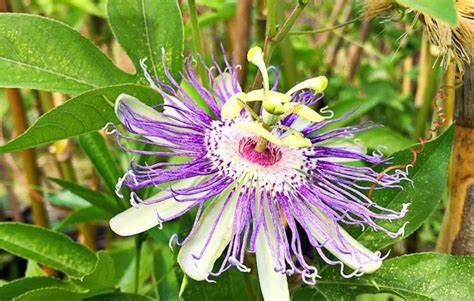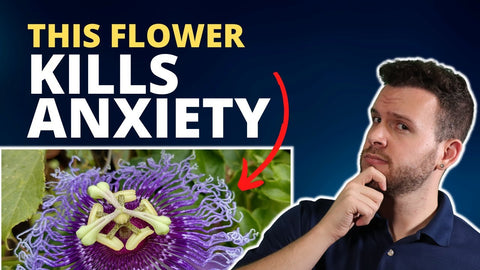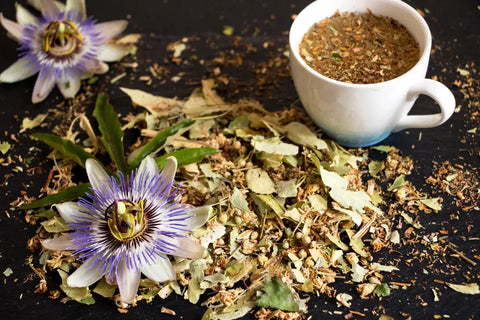Passiflora Vines: An Overview
Passionflower: Natural Remedy for Anxiety and Insomnia
Passiflora perennial vines are rarely utilized in gardens, however "passionflower" refers to 500 species.
A sticky substance with digesting enzymes in Passiflora foetida bracts traps insects. This reduces young flower and fruit eating.

Per species, Passifloras is a plant, shrub, or vine. Vines may reach 30 feet tall and 5 feet broad.
Passionflower Naturally Treats Anxiety and Insomnia
Beautiful passionflower Passiflora incarnata relieves anxiety and insomnia. Traditional medicine uses this herb to sleep and relax. Here are Passionflower's benefits and uses.
Understanding Passionflower Health Benefits
Passionflower boosts GABA, calming anxiety.
Passionflower decreases anxiety and increases sleep quality and duration, treating insomnia.
Promotes Hormone Balance: Passionflower calms mood swings, hot flashes, and nocturnal sweats.
Regular passionflower use decreases stress and boosts health.
Passionflower might ease headaches and cramping.
Passionflower Preparations and Doses for Anxiety and Insomnia
Enjoy effortless, effective relaxation with Passionflower Tea.
Ingredients:
Add 1/2 tsp dried passionflower leaves to 1 cup boiling water.
Lemon, honey (optional)
Instructions:
Tried dried passionflower leaves in a teapot or infuser.
Steep leaves 5-10 minutes in boiling water.
Strain tea into cup.
To taste, add honey and lemon.
Drink 1-2 cups daily, preferably in the evening, to relax and sleep.
Passion Flower Tincture
Passionflower tinctures are potent and complement juice or water.

Dosage:
Take 20-30 drops of passionflower tincture in water or juice 2-3 times a day or as needed to reduce anxiety and improve sleep.
Food Uses of Passionflower Water
Enjoy passionflower-infused water all day to relax.
Ingredients:
Second tea bag or tablespoon dried passionflower leaves
A liter water
Orange, lemon, or berry slices for flavor.
Instructions:
Put passionflower tea bags or dried leaves in a pitcher.
Water pitchers may hold fresh fruit slices.
Infuse 2 hours in fridge.
Remove tea bags or sieve leaves before pouring.
Drink flavored water all day to unwind.
Health for Passionflower
Bathe in passionflower
The passionflower bath soak may calm you after a long day.
Ingredients:
1 cup Epsom salts
Half cup dried passionflower leaves
1-2 drops lavender essential oil
Instructions:
In a basin, mix Epsom salts and dried passionflower leaves.
Several drops lavender.
Put warm water in your tub.
A 20-30-minute soak soothes body and mind.
Own Passionflower Moments
When anxious or insomniac, I take passionflower. Nighttime passionflower tea is my fave. Flowery flavor helps me relax and sleep after drinking it.
Nighttime passionflower tincture rocks. A few drops in water or juice before bed help me relax. On hectic days, I may take an afternoon dose to relax and reduce anxiety.
Wonderful passionflower baths please me. Epsom salt and passionflower bath for relaxation.
Conclusion
Daily passionflower decreases anxiety and enhances sleep. Relax with passionflower tea, tinctures, or baths.
Have you tried passionflower for sleep or anxiety? Tell us how to utilize this calming plant!
The herb passion flower (passiflora incarnata) has been used to treat anxiety, sleeplessness, convulsions, and hysteria. Passion flower, a southeastern North American perennial climbing vine, widely planted in Europe.
The herbal supplement contains plant blossoms, leaves, and stems. Passion flower is used in alternative medicine infusions, teas, liquid extracts, and tinctures.
Other uses
Passion flower supplements are also used:
ADHD (attention disorders)
Burns
Heart rhythm issues
Hemorrhoids
Pain
Sleep issues
Stress symptoms of menopause
However, passion flower is occasionally used or marketed for these purposes without evidence. Passion flower has not been shown to cure cardiac difficulties, stress, menopause, pain, burns, hemorrhoids, or ADHD, according to the National Center for Complementary and Integrative Health of the National Institutes for Health.1
Passion flower's usefulness in treating anxiety and other health issues needs more thorough scientific trials.6
Potential Side Effects
Passion flower side effects are rare but may include:
Drowsiness
Mind slowing
Nausea
Fast heartbeat
Vomiting
Avoid driving or operating heavy machinery until you know how passion blossom affects you.
Passion flower is generally harmless.7 However, the FDA does not control herb and supplement manufacture.
Passion flower may cause pregnancy difficulties, according to a tiny research. More study is needed to understand this danger.8
Most plants and supplements are untested, so their constituents and safety are unknown.
Dosage and Prep
Please note that these amounts are suggestions, not prescriptions.
Infusions: 2.5 grams, 3–4 times daily
Teas: Daily 4–8-gram dry herb tea7
Liquid extract: Three times daily, 10–30 drops
Three times a day, 10–60 drops tincture
Passion flower is not scientifically proven for youngsters.
Take Passion Flower Carefully
The same caution applies to passion flower as other natural supplement: Review the product label and consult a doctor or medical professional to determine the right dosage for you. Tell them about any additional drugs or therapies you use, even rarely.
As with other herbal therapies and pharmaceuticals, passion flower should not be taken while pregnant or nursing.
Drug Warnings and Interactions
Passion flower may interfere with other drugs and therapies, as with any herbal cure.1
A thorough list of passion flower-interactive drugs is available. This includes:
Antidepressants
Antihistamines
Benzodiazepines
Barbiturates
Narcotics
Passion flower may interact with blood thinners and anti-inflammatories.9 Kava and valerian root may also affect passion flower. Finally, alcohol, caffeine, and aspirin may interact poorly with passion flower.
Recap
Passion flower has the same warnings as other novel drugs: If you use or intend to take another medicine or supplement, ask your doctor about interactions.
Passion flower alone does not harm the liver. One case report connected kava (related to liver issues) with passion flower to a fatal liver damage.10
Alternatives to Passion Flower
Other treatments and cures may help if passion flower doesn't work or you want to try something else.

Other Herbal Supplements
Other anxiety supplements include chamomile, which multiple studies have proven to reduce anxiety and may work as an antidepressant.11 Greeks, Egyptians, and Romans utilized chamomile for millennia.
People with depression also benefit from St. John's Wort. St. John's Wort may cure mild to moderate depression, but anxiety is not yet proven.12
Medications, psychotherapy
Talk to a doctor if your anxiety disrupts your life. Before taking passion flower, attempt effective anxiety remedies.
Medication and CBT reduce anxiety symptoms.13 Your doctor may recommend you to a mental health professional for diagnosis and treatment.
Words From Verywell
Passion flower may reduce anxiety. More evidence is needed to support its usage for these and other uses. Consider the adverse effects before using this herbal supplement and tell your doctor about any drugs, substances, or supplements you use to avoid drug interactions.
Can children safely consume Passionflower?
Children can consume Passionflower in moderation, but it’s essential to consult with a pediatrician or healthcare professional before giving it to them. Dosages should be adjusted based on the child’s age, weight, and individual health needs. Generally, it’s better to use Passionflower under professional guidance for children.
How should Passionflower be prepared or consumed (e.g., tea, tincture, capsules, tablets)?
Passionflower can be prepared and consumed in various forms, including herbal teas, tinctures, capsules, and tablets. Herbal teas are made by steeping dried Passionflower leaves in hot water. Tinctures involve extracting the plant’s active compounds in alcohol. Capsules and tablets offer a convenient option for standardized dosages. The choice of form depends on personal preference and the specific condition being addressed. Always follow the recommended dosage instructions on the product label or seek guidance from a healthcare provider for the most suitable form and dosage for your needs.
What is Passionflower’s traditional and modern medicinal use?
Traditionally, Passionflower has been used by indigenous cultures in North America for its sedative and anxiolytic (anxiety-reducing) properties. It has been employed to alleviate anxiety, insomnia, and nervous tension. In modern herbal medicine, Passionflower is still valued for its calming effects and is used to promote relaxation, manage stress, and aid in sleep. It is available in various forms, including teas, tinctures, and capsules, to address these concerns.





Leave a comment